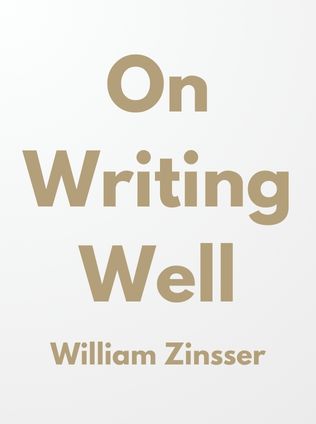
On Writing Well
The Classic Guide to Writing Nonfiction
By William Zinsser
Published 01/1976
About the Author
William Zinsser, born in 1922, was an influential writer, editor, and teacher whose work continues to resonate with writers around the world. His career spanned several decades, during which he contributed significantly to the fields of journalism, literature, and education. Zinsser's approach to writing was shaped by his experiences as a journalist for the New York Herald Tribune and as a professor at Yale University. However, it is his book On Writing Well, first published in 1976, that has cemented his legacy as one of the most important voices in the craft of writing.
On Writing Well has become a classic guide for writers, particularly those focused on nonfiction. Zinsser's clear, practical advice and emphasis on the fundamentals of good writing—simplicity, clarity, and identity—have made this book an essential resource for writers of all levels. His teachings continue to inspire and instruct, helping writers to refine their craft and find their unique voices. Zinsser passed away in 2015, but his influence endures through his writing and the countless students and readers he mentored over the years.
Main Idea
On Writing Well is more than just a manual on the mechanics of writing; it is a profound exploration of the art of communication. William Zinsser argues that anyone can learn to write well by focusing on three core principles: simplicity, clarity, and identity. He believes that writing is a craft that can be honed through practice, and that good writing is within reach for everyone, whether they are crafting a novel, a memoir, or a simple email. The book addresses common problems that writers face and offers practical solutions, making it a valuable guide for both beginners and seasoned writers.
Table of Contents
- The Principle of Simplicity
- The Principle of Clarity
- The Principle of Identity
- Genres of Nonfiction
- Writing Interviews
- Incorporating Humor
- Travel Writing
- Writing Memoirs
- Writing Criticism
- Science and Technology Writing
- Business Writing
The Principle of Simplicity
Zinsser begins by emphasizing the importance of simplicity in writing. He believes that simplicity is the foundation of good writing, as it makes the text easy to understand and engaging to read. According to Zinsser, simplicity means using common, precise words and straightforward sentence structures. This principle is crucial in nonfiction writing, where the goal is to communicate ideas clearly and effectively.
Eliminating Clutter
One of the key aspects of achieving simplicity is eliminating clutter. Clutter, according to Zinsser, refers to any word, phrase, or sentence that does not add value to the writing but instead obscures the message. Clutter can take many forms, including redundant words, unnecessary jargon, and overly complex sentences. Zinsser argues that writers must be vigilant in identifying and removing clutter to make their writing more direct and impactful.
For example, instead of writing "due to the fact that," a writer could simply say "because." Similarly, phrases like "in the event that" can be replaced with "if." These small changes can significantly improve the readability of a text by making it more concise and to the point.
Active voice is another tool that Zinsser recommends for achieving simplicity. In active voice, the subject of the sentence performs the action, making the sentence clearer and more direct. For instance, "The report was completed by the team" (passive voice) can be rewritten as "The team completed the report" (active voice). This not only simplifies the sentence but also makes it more engaging by placing the focus on the doer of the action.
"Writing improves in direct ratio to the number of things we can keep out of it that shouldn't be there." — William Zinsser
Using Precise Words
Precision in word choice is another critical element of simplicity. Zinsser advises writers to choose words that accurately convey their intended meaning. This often involves selecting one strong, specific word instead of several weaker ones. For example, instead of saying "very tired," one might say "exhausted." The latter word is more precise and carries more weight, eliminating the need for modifiers.
Using a thesaurus and a dictionary can be helpful tools in this process. Zinsser encourages writers to explore different words and their nuances to find the one that best fits their message. However, he also warns against using complex or obscure words merely to impress the reader. The goal is to communicate clearly, not to show off one's vocabulary.
Sign up for FREE and get access to 1,400+ books summaries.
You May Also Like
The Subtle Art of Not Giving a F*ck
A Counterintuitive Approach to Living a Good Life
By Mark MansonRich Dad Poor Dad
What the Rich Teach Their Kids About Money - That the Poor and Middle Class Do Not!
By Robert T. KiyosakiHow To Win Friends and Influence People
The All-Time Classic Manual Of People Skills
By Dale CarnegieQuiet: The Power of Introverts
The Power of Introverts in a World That Can't Stop Talking
By Susan Cain



















